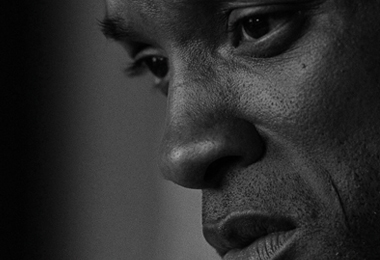[vc_row][vc_column][vc_column_text]

[/vc_column_text][/vc_column][/vc_row][vc_row el_class=”hero-header-text”][vc_column][vc_column_text]
Stories that Shaped my Faith
A Flawed Atonement
by Dominique Gilliard | June 6, 2016
[/vc_column_text][/vc_column][/vc_row][vc_row][vc_column][vc_column_text]
Seven Pounds, which was released in 2008, is one of the most underrated films of its decade, and it’s undoubtedly my favorite Will Smith movie.
This film’s title derives from Shakespeare’s The Merchant of Venice in which Shylock the moneylender agrees to make a loan on the condition that if it is not repaid, his debtor will repay him with a pound of flesh. In this film, Tim Thomas (Will Smith) offers his own “pound of flesh” as a sacrifice to atone for seven deaths he caused.
One night Tim is driving his fiancée home after a romantic date—where he just proposed—when his phone chimes, alerting him that he has a new message. He picks up his phone and begins to reply. As he tries to split his attention—between the road, his fiancée, and his phone—he swerves across the center line into oncoming traffic and causes a multi-car crash. Six strangers and his fiancée are killed.
In seven days, God created the world. And in seven seconds, I shattered mine.
Seeking atonement, Tim literally dedicates his life as a living sacrifice. Two years after the crash, he quits his job as an aeronautical engineer and donates part of his lung to his brother Ben, who is an IRS field agent. As he recovers at Ben’s house, Tim steals his brother’s IRS identification, which he uses to identify other potential recipients for his expiating gifts. Posing as an IRS agent, Tim is able to perform background checks on potential recipients. He then tracks them down and “interviews” them to assess whether they are worthy of his sacrificial offering. He requires each potential recipient to prove their virtue before they can receive his grace.
Tim ultimately identifies six individuals (his brother is the seventh) whom he deems worthy and provides them each with a gift that either extends or dramatically enhances their life. He offers his seven gifts of life, before God and to the recipients—in an effort to atone for his error. Each gift is something that the recipients could never provide for themselves, and he offers them with no strings attached.
His mission costs him his life, but through his death, his heart, eyes, and other vital organs are given to individuals who would have otherwise died, or at least would have gone through life without experiencing it fully.
In this way, Seven Pounds becomes an artistic, Eucharistic articulation. Tim’s broken body becomes a life-giving source for those who partake in it. Tim, who gives his life in selflessness, lives on through those who receive his body. The grace bestowed upon Tim’s recipients marks and seals their lives; and on receiving their gift of sacrificial love, each person is emboldened to live life anew, and to do so abundantly. Each recipient is therefore empowered by the gift, renewed to thrive in the world in new ways, both in their vocation and as people of peace in the world, ambassadors of love and reconciliation.
“In seven days, God created the world. And in seven seconds, I shattered mine,” Tim says. Seven Pounds is imperfect theologically, but it is a thought-provoking movie, especially for Christians. What if the church was known for devoting our lives to others as Tim does (without the judgment)? What if we saw ourselves as connected to others in ways that inclined us to sacrificially give of ourselves—even carnally—for their betterment? How would this change the world, our discipleship, and our understanding of Christian ethics? How would this reflect Christ in our world? How would this embody the sacraments we partake in?
[/vc_column_text][/vc_column][/vc_row]














